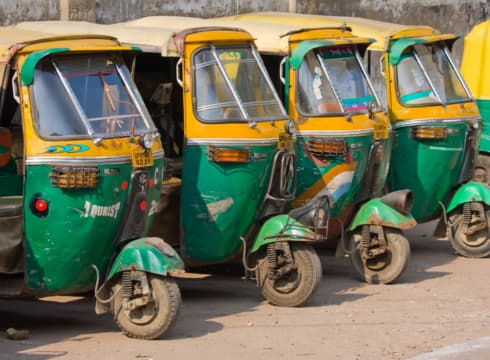In a hearing on Wednesday (April 12), a division bench held that the decision to levy GST did not violate fundamental rights
The court dismissed Uber's petition challenging the levy of GST adding that the notifications under challenge did not result in discrimination
Uber India had challenged the notifications, arguing that increasing the prices of auto rickshaw rides on the app would impact the market
Inc42 Daily Brief
Stay Ahead With Daily News & Analysis on India’s Tech & Startup Economy
The Delhi High Court has upheld the government’s decision to impose Goods and Services Tax (GST) on auto rickshaw rides booked through cab aggregator platforms. The decision delivered a setback to ride-hailing giants Uber and Ola who challenged the levy of GST on their services.
In a hearing on Wednesday (April 12), a division bench comprising Justices Manmohan and Manmeet Pritam Singh Arora held that the decision to levy GST did not violate fundamental rights. The bench further said that the classification of app-based cab aggregators as a separate class of service providers was rational and in line with the GST Act’s provisions.
The court dismissed Uber’s petition challenging the levy of GST. It stated that the notifications under challenge did not result in discrimination since the classification of e-commerce operators was recognised by the statute.
Uber India had challenged the November 2021 notifications, arguing that increasing the prices of auto rickshaw rides on the app would significantly impact the market.
Uber had also contended that the notification was discriminatory since the Centre had no plans to impose GST on auto rickshaw rides booked through offline methods, and the prices of local auto rides remained low.
According to Uber, the government’s directives failed to satisfy the test of reasonable classification. It said there could be no differentiation in tax treatment between passenger transport services provided by app-based auto drivers and those operating offline.
The move comes as auto rickshaw aggregators such as Uber, Ola and Rapido have faced increasing government scrutiny. In terms of taxes, many state governments have also moved to bring auto-rickshaw aggregators in line with the normal offline autos.
For instance, the Karnataka government directed regional transport authorities to levy convenience fees and GST on auto rides booked by passengers through ride-hailing apps in November 2022. Further, many states have questioned the disparity between the fare app aggregators levy and the fare notified by the government.
Increasing pressure from app aggregators also saw offline auto rickshaw drivers take to the streets of Bengaluru in March, demanding a complete ban on bike taxi operations in the city. Backed by 20 auto unions and organised by the Auto and Taxi Drivers Union, the city reportedly came to a halt as auto rickshaw drivers observed a 24-hour strike.
The problem also arises from the fact that there are no guidelines for auto-rickshaws in the vehicle aggregator norms notified by the Centre in 2020.
Further, the states which have formulated local norms have not included either bikes or auto-rickshaws in their aggregator norms, resulting in much friction between the authorities and app-based vehicle aggregators.
{{#name}}{{name}}{{/name}}{{^name}}-{{/name}}
{{#description}}{{description}}...{{/description}}{{^description}}-{{/description}}
Note: We at Inc42 take our ethics very seriously. More information about it can be found here.


